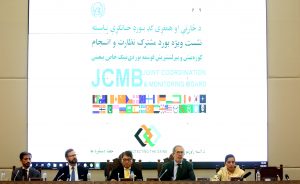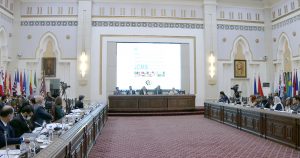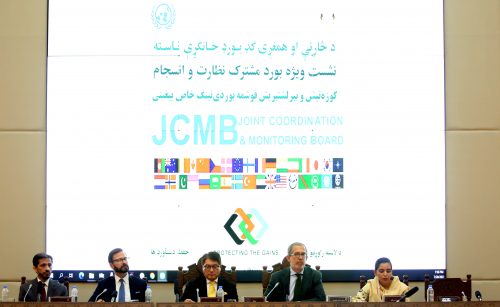Kabul, July 28, 2021
Dr. Omar Joya, Executive Director of the Biruni Institute, attended a high-level panel on aid conditionality at the twenty-third Joint Coordination and Monitoring Board (JCMB) meeting on July 28, 2021 at the Presidential Palace in Kabul.
The JCMB was established in 2006 as a coordination mechanism by the Government of Afghanistan and the international community to oversee the implementation of reforms as committed in the GoA’s strategic documents. The purpose of the twenty-third JCMB meeting in July 2021 was to review the progress in the Afghanistan Partnership Framework (APF) so that a positive joint review could be obtained at the Senior Officials Meeting (SOM) in November to ensure continuation of external assistance as pledged at the Afghanistan 2020 Geneva Conference.
The JCMB was inaugurated by the keynote address of HE Ashraf Ghani, President of the Islamic Republic of Afghanistan, and was co-chaired by the Ministry of Finance, Administrative Office of the President, and Special Representative of the Secretary-General of the United Nations for Afghanistan (UNAMA).
This year’s JCMB included three high-level panels. The first panel titled “On Aid Conditionality for Future of Afghanistan” was moderated by Mr. Von Brandt, Ambassador of the European Union Delegation to Afghanistan, and included Mr. Anwarul Haq Ahadi, Minister of Agriculture, Irrigation and Livestock; Mr. Edward Davis, Head of ARTF & Donor Coordination at the UK Foreign, Commonwealth and Development Office; Dr. Omar Joya, Executive Director of the Biruni Institute; and Ms. Salma Alokozai, Director General for Macro-Fiscal Policy Department at the Ministry of Finance.
At the panel, Dr. Omar Joya spoke about the effectiveness of conditionalities attached to development aid in Afghanistan. He distinguished between incentivized policy reform programs (such as the IMF programs, ARTF Incentives Program, and the World Bank Development Policy Grants) and the broader conditionalities that were imposed under various frameworks such as the Tokyo Mutual Accountability Framework (TMAF), Geneva Mutual Accountability Framework (GMAF), the Afghanistan Partnership Framework (APF) and others. Dr. Joya indicated that the latter category of conditionalities undermines aid predictability and ownership, and has broadly been ineffective. Prior to 2012, when no such conditionalities existed, Afghanistan made tremendous progress in basic human rights, gender equality, governance, and other important agenda, while this was not the case in the last decade when conditionalities were consistently present. Dr. Joya suggested that at a time when the country is in a widespread conflict affecting revenue collection, ensuring aid predictability and increasing discretionary resources are critical.







